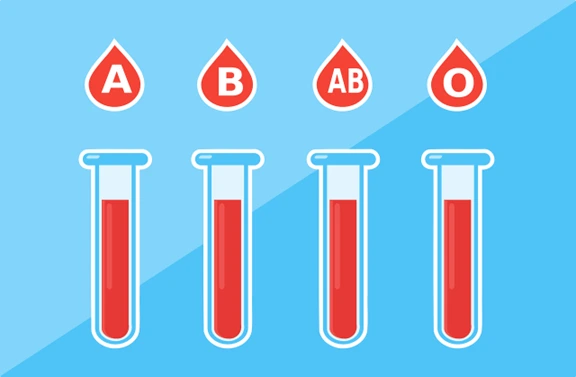You might know your blood type, and have heard of type A, B, AB, and O. You may remember from high school biology that some blood types donate to other blood types, and some can't. You might be surprised to learn that your blood type can indicate your risk of other conditions too.
What Are Blood Types?
There are four human blood types, A, B, AB, and O. The presence or absence of the Rh factor determines if your blood is positive or negative. This is what people mean when they say they have 'A positive' or 'O negative' blood.
Most of us have heard about blood types when discussing surgery. You may have learned that some blood types can't be transfused with other blood types. For instance, someone with type A-positive blood can't receive a transfusion with A-negative blood.
A person with AB-positive blood can receive a transfusion from all blood types and is sometimes called the 'universal recipient.' Type O-negative blood can be transfused to every other blood type and is often called the 'universal donor.' On the other hand, someone with type O-negative blood can only receive type O-negative blood.
How is Blood Type Related to Health?
Blood types are related to a gene, called the ABO gene. The ABO gene is only present in people with types A, B, and AB blood. The ABO gene, surprisingly, does not appear in type O blood. Although your blood type may not directly affect your health, the expression of the ABO gene may predispose you to certain health risks.
Researchers have learned this by comparing the prevalence of certain diseases in A, B, and AB blood type individuals with those with type O individuals. Since people with type O blood lack the ABO gene, any genetic disorders should be lower in these people.
Heart Disease
The ABO blood types are associated with a higher risk of cardiac disease, such as heart attack and stroke. It is thought that the blood type antigens change the surface of the red blood cells and may contribute to increased clotting and changes in the blood vessels.
Cancer
The reasons why ABO blood types are at greater risk for cancer are not clear, but it is evident that all three groups are at greater risk for non-environmental cancers. Scientists believe the ABO gene may cause cell changes in other body tissues.
Cognitive Impairment
Since blood type is implicated in heart health, it is not surprising it may be related to the health of your brain as well. Anything which affects blood flow to your brain, including high blood pressure, high cholesterol, diabetes, and blood clots, can cause or aggravate memory problems.
What You Can Do
You can't change your blood type, but you can take charge of your health. See your doctor regularly and make healthy changes in your life. Talk to your pharmacist and get their top tips on diet, wellness, and supplements to improve your heart health. Medications aren't cheap, but RxLess will show you top ways to save money when visiting the pharmacy.
Your favorite pharmacies, like CVS, Rite Aid, and Walgreens will honor your RxLess discount card for savings on prescriptions if your doctor wants you to take charge of your healthcare. rxless can save you money while you get top tips on keeping your blood healthy and your heart happy.

















